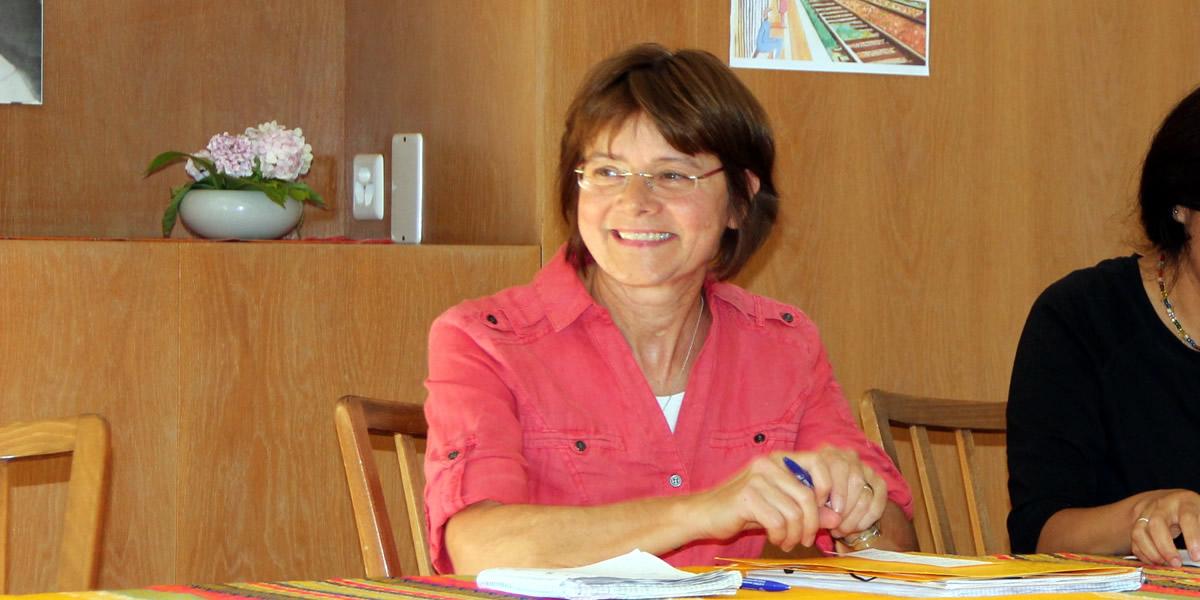“Full of joy I left everything behind”
“Full of joy I left everything behind.”
Regina Widmann recalls with a smile when in her early 20s, just a step away from marriage, she chose to join the Scalabrinian Secular Missionary Women. Today, more than 30 years have passed, and she has become the head of this Institute that is inspired by the charism of John Baptist Scalabrini. Without external signs to distinguish them, the missionaries work and carry out professions in the most diverse environments and contexts of the multi-ethnic societies of our time to transform from within every reality into an experience of encounter and welcome.
Interview with Regina Widmann, responsible general
of the Scalabrinian Secular Missionary Women
- On Oct. 9, Pope Francis will proclaim John Baptist Scalabrini a saint. How did Scalabrini come into your life and why did you choose to become a Scalabrinian secular missionary?
I come from a small town in southern Germany. I did not know Scalabrini or even emigration. I was searching for the meaning of life and wondering what plan God had for me. I was about to get married when I met ‘by chance’ the community of the Scalabrinian Secular Missionaries. I don’t know how to explain, but from the very beginning I experienced a joy that became greater and greater and drew me to leave everything behind: my plans, my securities, my relationships. I was amazed that while before they were very important to me, now they had become small things. I had everything, but I missed that joy that I saw in the missionaries and felt that this was also was my path. I entered the community out of joy, knowing nothing about migrants.
My first encounter with the world of migration was with Italians who had migrated to Stuttgart in the 1980s. They were lonely men who lived in shacks or collective housing near factories and slept in rooms full of bunk beds. We women used to go to them accompanied by Father Gabriele …, a Scalabrinian missionary. I learned Italian by meeting these men who made great sacrifices for their families in Italy and were very dignified. We would bring them a smile and a moment of comfort. They would return to their home once a year for Christmas and we would go to the station to greet them. I remember that the loudspeaker voice announcing the train to Milan was in Italian. One gentleman told me that his children, when they saw him coming back, told him, “You don’t bother us, it is just that we are not used to your presence at home anymore”. It was a great suffering for him.
- How do the Scalabrini Secular Missionaries carry on Scalabrini’s charism?
Our Secular Institute, the third institute of consecrated life in the Scalabrinian Family, was born in Solothurn, Switzerland with Adelia Firetti on July 25, 1961 in the midst of migrations from Southern to Northern Europe. We got to know Scalabrini through his Missionaries. In our journey we have let ourselves be led by his universal heart, by the passionate centrality of Jesus Christ crucified and risen in his life. We recognize in emigration a ‘theological place,’ a place where God reveals himself and meets us. We feel called to share the Scalabrinian spirituality first and foremost in the simple way we live relationships.
Often migrants and refugees feeling welcomed, tell us: “In relationships we have found our new homeland.” They have lost everything but thirst for a deep relationship that becomes hope, strength to move forward.
- In your years of service, is there an encounter that particularly struck you and that you carry in your heart?
The Diocese of Stuttgart had invited us to walk with the most marginalized migrants, who in the 1980s were Muslim Turks who were exposed to a great wave of xenophobia. Their homes were also burned down. Families told me they had buckets full of water in their homes because “you never know….” There was a lot of fear. I was visiting these people to make them close to a Church that walks with every man and every migrant. Indeed, “there where man suffers there is the Church.” I would go around the neighbourhood and knock-on doors with the names in Turkish. I was amazed at how they welcomed me. The most beautiful encounters were in the hospital: in front of suffering, in front of the mystery of Easter, we can really meet each other deep inside, beyond the different language, religion and culture. The important thing is not the doing: yes, we live our secular consecration in the most diverse environments, in the professions, but secularity needs a strong relationship with God to be able to see (recognise) how the Spirit works in us and in others. Scalabrini said that the most living and powerful part of our apostolate is contemplation: it is the relationship with God that makes us see how He gives Himself to man and transforms our and migrants’ pain and hope into prayer. Our God is a God who comes down to walk with us and bring us to the Father.
Over the last years, sharing the life with Christian refugees, we have received a big testimony of faith: they teach us that the only real treasure is faith. I think for example of the Eritrean refugees, the Christians of Iraq, who because of faith have been forced to flee and often tell us, “We have lost everything, but our gold is faith.”
- Today, the issue of immigration has become a political flag, how can one follow Scalabrini’s example and be able to see in the other a brother in need of help?
Scalabrini had a strong relationship with God, it was rooted in him. We must allow ourselves to be looked upon by God, by the love of a God who seeks man to walk with him. If we discover how we are loved, we cannot help but see the beauty in others as well. We are the Body of Christ; in his Body we are children in the Son of God and we are brothers and sisters with everyone. We are already one human family. My life already belongs to the other in Jesus. We must try to make room for Jesus so that He can love through us. Our teachers in love are the migrants, the imprisoned, the sick. They question us, they wake us up. The young people we meet have so many questions, but they have not yet found true Life. In our International Centres we bring them together with migrants, we form them in the art of encounter. These are real laboratories of relationships, where young people of different languages, cultures and backgrounds learn to look at the other with new eyes. Young people are our future, and we work with them so that brotherhood and appreciation of diversity grows.
---------------------------------------
[ITALIANO] Regina Widmann -responsabile generale della nostra comunità- ricorda quando ha
scelto di entrare a far parte delle Missionarie Secolari Scalabriniane.
“Piena di gioia ho lasciato tutto”. Regina Widmann
ricorda con un sorriso quando, poco più che ventenne, ad un passo dal
matrimonio, ha scelto di entrare a far parte delle Missionarie Secolari
Scalabriniane. Oggi sono passati più di 30 anni e lei è diventata la
responsabile di questo Istituto Secolare che si ispira al carisma di
Giovanni Battista Scalabrini. Senza segni esterni che le distinguano, le
Missionarie lavorano e svolgono professioni nei più diversi ambienti e
contesti delle società multietniche del nostro tempo per trasformare dal
di dentro ogni realtà in un’esperienza di incontro e accoglienza.
» Leggi più
»
VIDEO IT
֎
[PORTUGUÊS] Entrevista com Regina Widmann, responsável geral das Missionárias Seculares Scalabrinianas.

